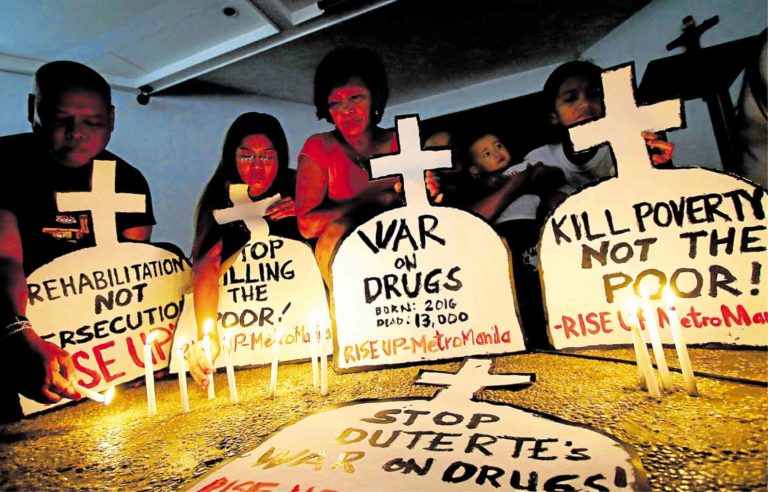Rights group urges inquiry into Philippine drug war killings

UNFORGOTTEN. In this October 2019 photo, relatives of EJK victims in the war on drugs light candles to call for justice for their slain loved ones. INQUIRER/RICHARD A. REYES
GENEVA — Human Rights Watch is calling on the U.N.’s top human rights body to launch an independent investigation into the Philippine government’s drug war that has left thousands dead, pointing in particular to its harmful effects on children.
The advocacy group made the call alongside Wednesday’s launch of a report timed for the U.N.-backed Human Rights Council session next month. The report highlights the distress and economic troubles faced by many children whose family breadwinners were killed in the violence over nearly the last four years.
The 48-page report is based on nearly 50 interviews and examines the impact of about two dozen killings under President Rodrigo Duterte’s drug war.
Some children have been forced to drop out of school, go to work, and even live in the streets as the government doesn’t offer a program to support children left behind by such killings, the rights group said.
“Filipino children have suffered horribly from President Duterte’s decision to unleash the police and their hitmen against suspected drug users,” the group’s Philippines researcher Carlos Conde said. “The government needs to stop this endless violence that is upending children’s lives and direct assistance to the children harmed.”
Duterte and Philippine police officials did not immediately comment on the report but they have insisted in the past that suspects were gunned down after they fought back during arrests or raids. The Philippine government maintains it has no policy condoning extrajudicial killings.
Duterte, however, has openly threatened drug traffickers with death and encouraged suspects to be shot when they threaten the lives of law enforcers.
The Philippines’ record is expected to come up at the June Human Rights Council session in Geneva – if coronavirus conditions permit, based on an assessment by Swiss authorities. Human Rights Watch is calling for an independent international inquiry into the killings.
The Philippines is currently one of the council’s 48 member states.
Duterte’s government pulled out of the International Criminal Court after it opened a preliminary probe in February 2018 into complaints about the killings.
Disclaimer: The comments uploaded on this site do not necessarily represent or reflect the views of management and owner of Cebudailynews. We reserve the right to exclude comments that we deem to be inconsistent with our editorial standards.
